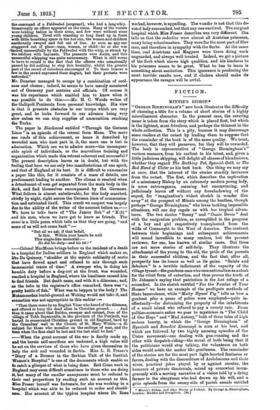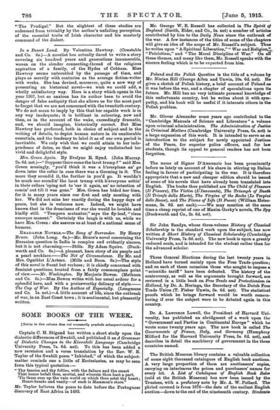FICTION.
MINNIE'S BISHOP.*
"GEORGE Brararnousx's" new book Illustrates the difficulty of choosing a title for a volume of short stories of a highly miscellaneous character. In the present case, the covering name is taken from the story which is placed first, bat which is the lightest, most frivolous, and perhaps the thinnest in the whole collection. This is a pity, because it may discourage some readers at the outset by leading them to suppose that the remainder of the book is of the some quality. We trust, however, that they will persevere, for they will be rewarded. The book is representative of "George Birmingham's" various manners, from his earliest to his latest, and, given a little judicious skipping, will delight all classes of hisadmirers, whether they regard The Seething Pot, Spanish Gold, or The lied Hand of Ulster as his best book. One thing we may say at once, that the interest of the stories steadily increases from the outset. The first, which describes the captivation of a missionary Bishop by an extremely modern young lady, is mere extravaganza, amusing but unconvincing, and judiciously leaves off without any foreshadowing of the sequel, for "imagination's widest stretch in wonder dies away" at the prospect of Minnie among the heathen, though perhaps "George Birmingham," who loves tackling impossible situations, will one day regale us with her tropical adven- ture°. The two stories " Sonny " and " Onnie Dover" deal with the emigration problem, as exemplified in the progress of a boy and girl respectively transplanted from the wilds of Connaught to the West of America. The contrast between their beginnings and subsequent achievements will sound incredible to many readers, but the present reviewer, for one, has known of similar eases. But these are not mere stories of self-help. They illustrate the attachment of the young to the old, the pride of the parents in their successful children, and the fact that, after all, prosperity has its losses so well as its gains. "Sainte and Scholar." is a terrible indictment of the rapacity of the village tyrant —the gombeen man who urea nationalism as a cloak for the vilest form of extortion, and thus proves the truth of Dr. Johnson's saying that patriotism is the last refuge of a scoundrel. In the sketch entitled "For the Famine of Your Houses" we have an example of the profligate methods of State benevolence, while "Ratty Hynes' Pig" tells us how a gunboat pies a posse of police were employed—quite in- effectually—for distraining the property of the inhabitants of a small island who refused to pay a county rate. From politico-economic satire we peas to mysticism in "The Child of Our Hope" and "Mad Antony," both of them tales of high serious beauty, in which the "George Birmingham" of Hyacinth and Benedict Kavanagh is seen at his best, and which are followed by two highly amusing episodes of the Ulster movement—one dealing with gun.running and the other with despatch.riding—the moral of both being that if the politicians would stop talking, the volunteers on both sides would settle the matter like gentlemen. The remainder of the stories are for the most part light-hearted fantasias or farces, dealing with the discomfiture of Archdeacons and their wives, practical jokes played by or against curates, the humours of private theatricals, mixed up somewhat incon- gruously with a moving narrative of a vision told by a dying farmer to the clergyman who had drawn up his will, and a grim episode from the seamy side of parish annals entitled L:211ci,rifis Bisehrot dand other Stories of Ireland. By George A. Birmingham. o Stoughton. [OA]
"The Prodigal." But the slightest of these studies are redeemed from triviality by the author's unfailing perception of the essential traits of Irish character and his masterly command of the dialect.



































 Previous page
Previous page